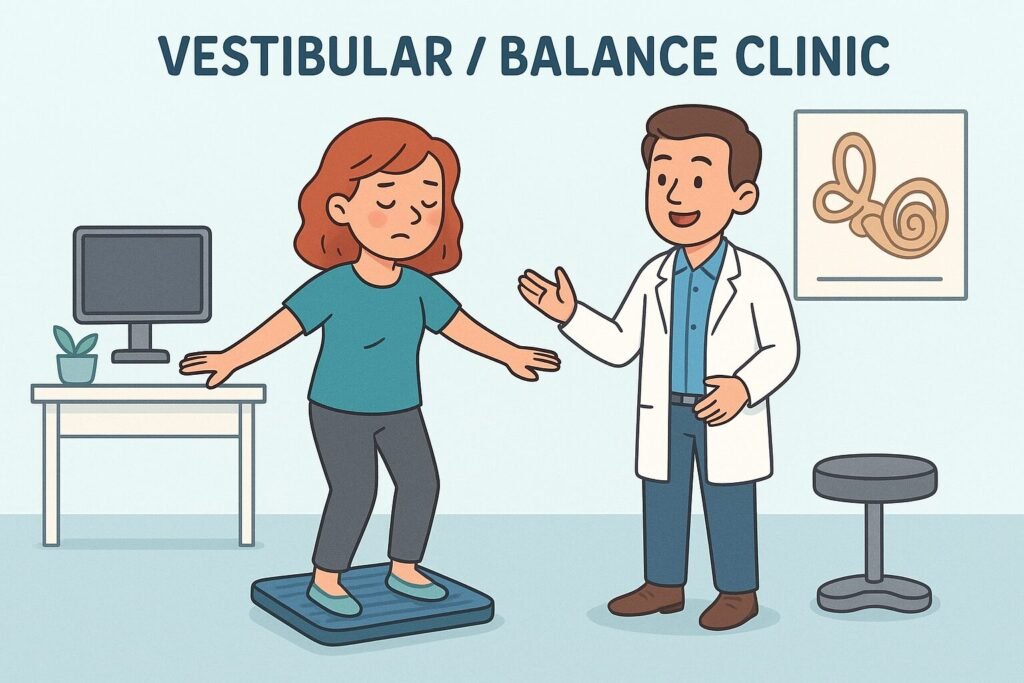Maintaining balance is something we often take for granted-until it becomes a daily challenge. For many people struggling with dizziness, unsteadiness, or disorientation, vestibular & balance therapy can be life-changing. This specialized form of rehabilitation focuses on the vestibular system, the inner-ear mechanism that controls balance and spatial orientation.
But the big question is: who can truly benefit from vestibular & balance therapy? Let’s explore how this treatment works, who it’s designed for, and why it’s gaining recognition as a vital part of modern healthcare.
Signs You May Need Vestibular System Therapy
Not sure if therapy is right for you? Look for these warning signs:
Dizziness and Vertigo Episodes
If you frequently experience spinning sensations or sudden dizziness, a vertigo test may reveal an underlying vestibular disorder.
Struggles with Balance and Coordination
Regular tripping, stumbling, or unsteady walking can point to a vestibular condition.
Visual Disturbances Linked to Vestibular Neuro Issues
Blurry vision, difficulty reading, or sensitivity to moving objects often signal problems in the vestibular neuro system.
Understanding Vestibular & Balance Therapy
Vestibular therapy is a targeted approach to restore stability and reduce symptoms of dizziness, vertigo, and imbalance. It combines exercises, techniques, and lifestyle guidance to retrain the brain and body to adapt to vestibular problems.
What is the Vestibular System and Why It Matters?
The vestibular system is a network inside your inner ear that works with your eyes and muscles to keep you upright and steady. When it malfunctions, even simple tasks like walking across a room or standing up can feel overwhelming.
Common Vestibular Problems That Affect Daily Life
Some common issues include:
- Persistent dizziness and vertigo
- Trouble focusing vision during movement
- Balance-related falls or unsteadiness
- Fatigue and disorientation
These conditions highlight why vestibular system therapy is crucial for long-term stability.
Who Can Benefit from Vestibular & Balance Therapy?
This therapy is not just for one group-it helps a wide range of people:
Seniors Facing Age-Related Vestibular Condition
As we age, balance naturally declines, increasing fall risks. Therapy strengthens coordination and confidence.
Athletes Recovering from Head Injuries
Concussions and inner-ear trauma often lead to vestibular problems. Rehabilitation accelerates safe return to activity.
People with Chronic Dizziness and Inner Ear Disorders
Those struggling with vestibular neuro disorders often see significant relief from therapy programs.
Patients Seeking Clarity After a Vertigo Test
If you’ve taken a vertigo test and received a diagnosis, vestibular therapy offers a structured path toward recovery.
How Vestibular Therapy Works in Practice
Personalized Treatment Plans for Vestibular Problems
Every patient’s experience is unique. Therapists assess your symptoms and design tailored exercises to improve balance and reduce dizziness.
Role of Advanced Techniques in Vestibular System Therapy
Cutting-edge methods like gaze stabilization, balance training, and motion desensitization exercises are core to vestibular system therapy.

Why Early Intervention Matters in Vestibular Neuro Health
Ignoring dizziness or imbalance may worsen symptoms. Early treatment helps retrain the brain and prevent falls. For anyone facing vestibular condition challenges, timely care can make all the difference.
Choosing the Right Care: Spotlight on MERF Vestibular & Balance Clinic
Expert Care for Complex Vestibular Conditions
The MERF Vestibular & Balance Clinic is known for its advanced diagnostic tools and compassionate approach. Patients receive expert care for even the most stubborn balance issues.
Patient Success Stories and Recovery Journeys
At MERF Vestibular & Balance Clinic, patients often share how therapy transformed their daily lives-from regaining independence to enjoying hobbies again without fear of falling.

FAQs on Vestibular & Balance Therapy
Q1: Is vestibular therapy only for older adults?
No. While seniors often benefit, people of all ages-athletes, accident survivors, or those with inner-ear disorders-can improve with therapy.
Q2: How long does it take to see results?
Many notice improvement within weeks, but recovery timelines vary based on the severity of the vestibular condition.
Q3: What is the difference between a balance test and a vertigo test?
A balance test evaluates overall stability, while a vertigo test focuses on inner-ear disorders causing spinning sensations.
Q4: Can vestibular therapy help after a concussion?
Yes. Athletes and patients recovering from head trauma often benefit from rehabilitation targeting vestibular neuro pathways.
Q5: Are medications always required for vestibular problems?
Not always. While medication can manage symptoms, therapy addresses the root cause by retraining the body.
Q6: Is vestibular system therapy safe?
Yes. It’s a non-invasive, tailored program guided by trained specialists.
Conclusion: Taking the First Step Towards Better Balance
If you’ve been struggling with dizziness, imbalance, or uncertainty after a vertigo test, you don’t have to live in fear of falling. Vestibular & balance therapy offers a proven pathway to regain confidence and stability. Clinics like MERF Vestibular & Balance Clinic provide the expertise and support needed to overcome even the toughest balance challenges.
Taking action early could mean the difference between struggling daily and living life with renewed freedom and independence.

